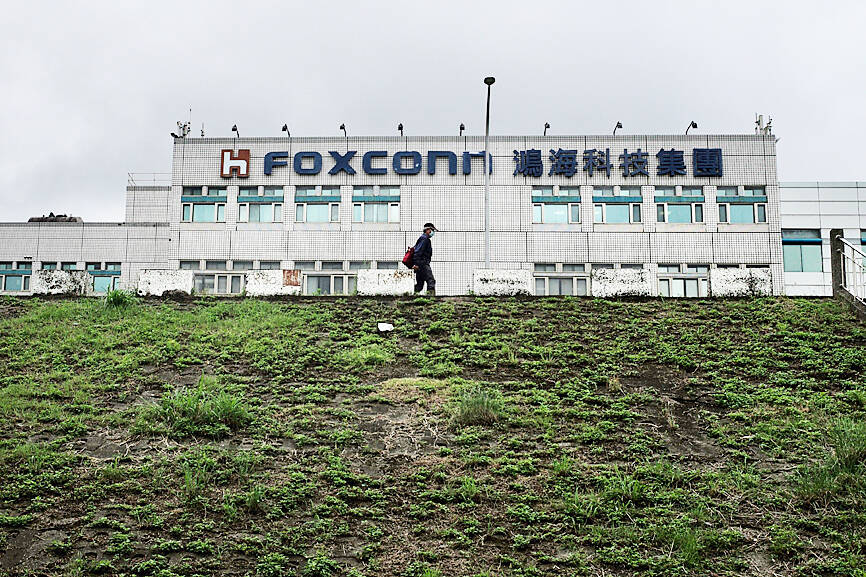Foxconn Technology Group (富士康科技集團) yesterday said a pay-related “technical error” occurred when hiring new recruits at an iPhone factory in China that has been hit with COVID-19, and apologized to workers after the company was rocked by fresh labor unrest.
Men smashed surveillance cameras and clashed with security personnel as hundreds of workers protested at the world’s biggest iPhone plant in Zhengzhou on Wednesday, in rare scenes of open dissent in China sparked by claims of overdue pay and frustration over severe COVID-19 restrictions.
In videos circulated on social media, workers said they had been informed that the Apple Inc supplier intended to delay bonus payments. Some workers complained they were forced to share dormitories with colleagues who had tested positive for COVID-19.

Photo by Sam Yeh, AFP
“Our team has been looking into the matter and discovered a technical error occurred during the onboarding process,” Foxconn said in a statement, referring to the hiring of new workers.
“We apologize for an input error in the computer system and guarantee that the actual pay is the same as agreed and the official recruitment posters.”
The apology was an about-face from a day earlier when Foxconn said it had fulfilled its payment contracts.
The unrest comes while China is logging record numbers of COVID-19 infections and grappling with lockdowns that have fueled frustration across the country. It has also exposed communication problems and a mistrust of Foxconn management among some staff.
The largest protests had died down and the company was communicating with employees engaged in smaller protests, a Foxconn source familiar with the matter said yesterday.
The person said the company had reached “initial agreements” with employees to resolve the dispute, and production at the plant was continuing.
Mounting worker discontent over COVID-19 outbreaks, strict quarantine rules and shortages of food had seen many employees flee the enclosed factory campus since last month after management implemented a “closed-loop” system that isolated the plant.
Many new recruits had been hired to replace the workers who had fled — estimated by some former staff to have reached thousands.
The Taiwanese company said it would respect the wishes of new recruits who wanted to resign and leave the factory campus, and would offer them “care subsidies.”
The Foxconn source said the subsidies amounted to 10,000 yuan (US$1,400) per worker.
Home to more than 200,000 workers, Foxconn’s Zhengzhou plant has dormitories, restaurants, basketball courts and a soccer pitch across its sprawling 140 hectare facility.
The factory makes Apple devices including the iPhone 14 Pro and Pro Max, and accounts for 70 percent of iPhone shipments globally.
Apple said it had staff at the factory and was “working closely with Foxconn to ensure their employees’ concerns are addressed.”
Several shareholder activists said the protests showed the risks Apple faces through its reliance on manufacturing in China.
“The extreme dependence of Apple on China, both as a [consumer] market and as its place of primary manufacturing, we see that a very risky situation,” said Christina O’Connell, a senior manager for SumOfUs, a non-profit corporate accountability organization.
A separate source said the unrest had made it certain that they would not be able to resume full production by the end of the month.
Apple has said it expects lower shipments of premium iPhone 14 models than previously anticipated.

The Eurovision Song Contest has seen a surge in punter interest at the bookmakers, becoming a major betting event, experts said ahead of last night’s giant glamfest in Basel. “Eurovision has quietly become one of the biggest betting events of the year,” said Tomi Huttunen, senior manager of the Online Computer Finland (OCS) betting and casino platform. Betting sites have long been used to gauge which way voters might be leaning ahead of the world’s biggest televised live music event. However, bookmakers highlight a huge increase in engagement in recent years — and this year in particular. “We’ve already passed 2023’s total activity and

Nvidia Corp CEO Jensen Huang (黃仁勳) today announced that his company has selected "Beitou Shilin" in Taipei for its new Taiwan office, called Nvidia Constellation, putting an end to months of speculation. Industry sources have said that the tech giant has been eyeing the Beitou Shilin Science Park as the site of its new overseas headquarters, and speculated that the new headquarters would be built on two plots of land designated as "T17" and "T18," which span 3.89 hectares in the park. "I think it's time for us to reveal one of the largest products we've ever built," Huang said near the

China yesterday announced anti-dumping duties as high as 74.9 percent on imports of polyoxymethylene (POM) copolymers, a type of engineering plastic, from Taiwan, the US, the EU and Japan. The Chinese Ministry of Commerce’s findings conclude a probe launched in May last year, shortly after the US sharply increased tariffs on Chinese electric vehicles, computer chips and other imports. POM copolymers can partially replace metals such as copper and zinc, and have various applications, including in auto parts, electronics and medical equipment, the Chinese ministry has said. In January, it said initial investigations had determined that dumping was taking place, and implemented preliminary

Intel Corp yesterday reinforced its determination to strengthen its partnerships with Taiwan’s ecosystem partners including original-electronic-manufacturing (OEM) companies such as Hon Hai Precision Industry Co (鴻海精密) and chipmaker United Microelectronics Corp (UMC, 聯電). “Tonight marks a new beginning. We renew our new partnership with Taiwan ecosystem,” Intel new chief executive officer Tan Lip-bu (陳立武) said at a dinner with representatives from the company’s local partners, celebrating the 40th anniversary of the US chip giant’s presence in Taiwan. Tan took the reins at Intel six weeks ago aiming to reform the chipmaker and revive its past glory. This is the first time Tan